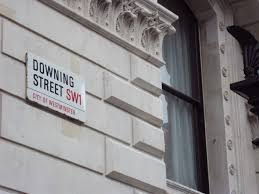4 April 2024
Who Was George Downing?
Founding fathers.
By Neil Tidmarsh

Exasperated by the lack of talent in today’s Westminster? Tired of the mediocrity and dullness of modern politicians? Bored by the forgone conclusion of the forthcoming general election (whenever that might happen – but do we care – plus ca change etc etc)? Longing for a return to the good old days when our political servants were honourable statesmen of gigantic stature – the worthy ornaments of a glorious democracy they helped to shape – who knew what the country needed and how to achieve it?
Ok, so let’s cheer ourselves up by looking at one of the giants from that golden past, and let’s go right back to the seventeenth century, to chapter one of modern British politics, to year zero of parliamentary democracy and constitutional monarchy. Let’s take a close look at George Downing.
George who?
George Downing (1623-1684), English preacher, politician and diplomat. The son of a Puritan barrister of the Inner Temple. Born in Dublin but brought up in Salam, New England (his uncle was the first governor of the Massachusetts Bay Colony). He was in the first class of students to enter Harvard, taught there after graduating and then became a ship’s chaplain. His voyages took him to the West Indies and then, in 1646, to England.
He arrived destitute – absolutely penniless – in a country divided by civil war, King against Parliament. Nevertheless he found a generous patron in Colonel John Okey, a successful and influential officer in parliament’s New Model Army, who took him in, fed him, clothed him and gave him employment as a chaplain in his regiment of dragoons.
Formed by the Puritan and proto-Republican culture of Massachusetts, Downing was a very effective advocate for parliament’s anti-monarchical cause and rejoiced in the defeat and execution of King Charles I in 1649. He was clearly a man of considerable ability; by 1650 he had been appointed by Oliver Cromwell himself as scoutmaster-general – ie spymaster – in Scotland, where he proved himself to be particularly gifted in the dirty business of espionage. He also proved himself gifted in the dubious business of amassing great personal wealth. He was good with money and was made an officer of the Exchequer when he became a member of parliament in 1654 (marrying a wealthy and well-connected aristocratic bride in the same year).
In 1657, in spite of his republican beliefs, he enthusiastically seconded a proposal to offer Cromwell the crown of England. The proposal failed but Downing’s willingness to compromise his ideals was well-rewarded – Cromwell made him ambassador to the Netherlands. (By contrast, his old sponsor and benefactor Colonel John Okey stuck to his principles and opposed Cromwell’s ambition to become king – and was stripped of his rank and regiment as a result.)
The posting to Holland was an absolutely key appointment. England and the Netherlands were potential allies as fellow republics but also potential enemies as rival mercantile powers. It was also an espionage hub for monitoring and frustrating the activities of exiled Royalists on the continent, a duty which Downing undertook with great dedication.
But Cromwell’s death in 1658 plunged the English republic into an existential crisis. Downing saw which way the wind was blowing and made clandestine contact with those exiled Royalists and offered his services to the exiled Charles II. He betrayed military secrets to them, de-coding and then passing on letters sent to him by John Thurloe, England’s secretary of state, postmaster general and spymaster.
So he was well-placed to survive and indeed thrive when the monarchy was restored in 1660. “Whatever Charles II thought of this old enemy, who had revealed himself to be a shameless and opportunistic turncoat, he was too useful to punish, too cunning to leave unemployed.” (Charles Spencer, Killers of the King). The King rewarded him with a knighthood and a gift of land next to Saint James’s Park in London. He remained an MP and was reappointed as an officer of the Exchequer and as ambassador to the Netherlands.
In Holland he continued to exercise his talent for espionage; his secretary, none other than Samuel Pepys, claimed that Downing’s spy rings were so well organised and his spies so well trained that they managed to steal secret papers from the Dutch leader Johan de Witt’s bedroom while he slept and return them undetected later the same night after Downing had read them. But whereas Downing had previously dedicated himself to tracking and obstructing exiled Royalists, he now dedicated himself to tracking down English regicides who had escaped to the continent after the Restoration. Many of them had passed through Holland where they were largely unmolested by the sympathetic citizens and authorities of the Dutch republic. Downing knew that his new master King Charles II would generously reward anyone who delivered them up to royal vengeance.
One of those regicides was his old patron and benefactor Colonel John Okey. Okey had played an active part in the trial and execution of Charles I and had signed the king’s death warrant, so he’d been condemned to death following the Restoration. He’d managed to flee the country before he could be arrested and had found refuge in Germany with another regicide, John Barkstead. In April 1662 their wives crossed the Channel to join them and the two men travelled to Holland to meet them. Doubting that his old and presumably grateful protégé Downing would act against him, Okey nevertheless sought assurances via indirect channels. Downing confirmed that he had no orders to intercept him or his companion.
Nevertheless Downing and his henchmen pounced on Okey and Barkstead and a third regicide, Miles Corbet, within twenty-four hours of their arrival in Delft. The three exiles were beaten, manacled at wrist and ankle and brutally incarcerated. The Dutch authorities protested vehemently but Downing trumped their arguments by flourishing an arrest warrant which they themselves had issued (it was a blank arrest warrant which Downing had somehow managed to procure some time before, to be used in just such an eventuality). The three prisoners were sent to England and promptly executed – hanged, drawn and quartered in public.
This act of self-serving treachery – the betrayal of his own sponsor and benefactor – blackened Downing’s name throughout Europe and the American colonies. “ ‘In New England’, wrote an eighteenth-century governor of Massachusetts, ‘it became a proverbial expression to say of a false man who betrayed his trust, that he was an arrant George Downing’.” (Adrian Tinniswood, The Rainborowes.) Even his secretary Samuel Pepys – a confirmed Royalist – was amazed and disgusted by this proof that his master was “a perfidious rogue.” Pepys wrote that although “the action is good and of service to the King, yet he (Downing) cannot with any good conscience do it” and added “all the world took notice of him for a most ungrateful villain for his pains.”
But Downing clearly cared less about conscience than about extravagant royal rewards. The grateful king ennobled him – he became the 1st Baronet Downing in 1664 – and granted him even more land and money.
He continued to serve as ambassador to the Netherlands where he intrigued against the Dutch, promoting a policy of provocation and friction which eventually lead to the Second Anglo-Dutch War, so disastrous for both sides. (The French first minister called him “the greatest quarreller of all the diplomats in Europe”.)
As Teller of the Exchequer, his innate financial ability and his experience of Dutch capitalism did much to keep English finances afloat during Charles II’s reign. It also helped him to amass great personal wealth; he died a very rich man (but a notoriously mean one, as even Samuel Pepys admitted) in 1684. His fortune was founded on property, on the houses and roads he’d built on the land he’d acquired in and around London. He gave his name to one of those roads; Downing Street.
Yes, the street at the heart of British government, the foundation of British politics, commemorates a complete bastard, a politician of the very worst sort, a treacherous, grasping and unprincipled opportunist.
Dull and decent men like Starmer and Sunak don’t seem so bad now, do they? And as for the rest of them at Westminster, well, we’ve had worse, clearly. A lot worse. So perhaps we should count our blessings rather than be exasperated / bored / fed up with today’s politicians. There, I said this would cheer us up, didn’t I?


